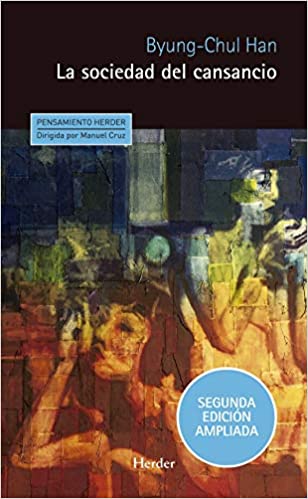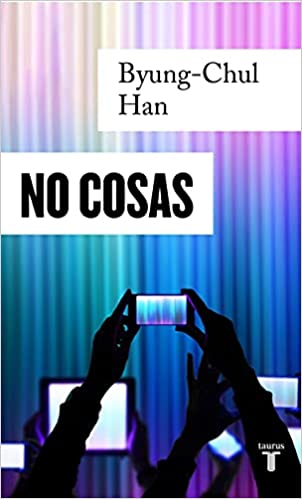The further we move away from philosophy as a matter of study and even as an existential wardrobe, to a greater extent it can be interesting to approach the literature that borders on any metaphysical knowledge as a way of solving new evils above the narrative of Self Help. That is what a Byung-Chul Han whose philosophical essays travel the world.
It does not have to be a matter of surrendering to the arms of Nietzsche. It is not that the attempt to enlighten us with clairvoyance should address the answer to the deepest questions. It is just a matter of being interested in what can alienate us, distance us from our will in that crucible of information, customs, customs and patterns of normality. and following the best practices.
Our current exposure to the world, through social networks, makes us like prisoners subjected to constant trial. Keeping your papers in order to build your defense is essential to achieving freedom. Because in the contrast between the social and the individual, trompe l'oeil emerges that integrate us all into falsehoods or at least into discordant standardizing patterns. Happiness is material no matter what, work should be little less than a source of pleasure. Everyone else opts for self-realization and you should be in it, citizen...
Byun-Chul Han's Top 3 Recommended Books
The society of tiredness
Byung-Chul Han, one of the most innovative philosophical voices to emerge in Germany recently, asserts in this unexpected best seller, whose first print was sold out in a few weeks, that Western society is undergoing a silent paradigm shift: the excess of positivity is leading to a society of tiredness. Just as the Foucauldian disciplinary society produced criminals and madmen, the society that has coined the slogan Yes We Can produces exhausted, failed, and depressed individuals. According to the author, resistance is only possible in relation to external coercion.
The exploitation to which oneself is subjected is much worse than the external one, since it is helped by the feeling of freedom. This form of exploitation is also much more efficient and productive because the individual voluntarily decides to exploit himself to exhaustion. Today we lack a tyrant or a king to oppose saying No. In this sense, works like Indignaos, by Stéphane Hessel, are not of great help, since the system itself makes disappear what one could face.
It is very difficult to rebel when victim and executioner, exploiter and exploited, are the same person. Han points out that philosophy should relax and become a productive game, which would lead to entirely new results, that Westerners should abandon concepts such as originality, genius, and creation from scratch and seek greater flexibility in thinking: 'all of us we should play more and work less, then we would produce more. '
Or is it a coincidence that the Chinese, for whom originality and genius are unknown concepts, are responsible for almost every invention - from pasta to fireworks - that has left its mark in the West? However, this continues to be for the author an unattainable utopia for a society in which everyone, even the highest paid executive, works like slaves, postponing leisure indefinitely.
The disappearance of rituals
Laugh yourself at the alienation advocated by the arrival of the Industrial Revolution and satirized by Chaplin. The matter has grown in sophistication and the interference of the system encompasses even the most unsuspected. There is no time to waste, the machine is always hungry.
Rituals, as symbolic actions, create a community without communication, since they are established as signifiers that, without transmitting anything, allow a community to recognize their signs of identity in them. However, what predominates today is communication without community, since there has been a loss of social rituals.
In the contemporary world, where the fluidity of communication is an imperative, rituals are perceived as obsolescence and a dispensable hindrance. For Byung-Chul Han, his progressive disappearance leads to the erosion of the community and the disorientation of the individual. In this book, rituals constitute a contrasting background that serves to outline the contours of our societies. Thus, a genealogy of his disappearance is sketched while he realizes the pathologies of the present and, above all, the erosion that this entails.
No-Things: Bankruptcies of Today's World
Authentic thinking even to address the connectivity in which we as humans immerse ourselves in the intangible. The powerful construct, the Matrix, human creation as an artificial intelligence that dominates us little by little, irrevocably. Reality is destructured and events become fickle, unreal...
Today, the world is emptied of things and filled with disturbing information like disembodied voices. Digitization dematerializes and disembodies the world. Instead of saving memories, we store huge amounts of data. The digital media thus substitute memory, whose work they do without violence or too much effort.
The information falsifies the events. It thrives on the stimulus of surprise. But this one doesn't last long. We quickly feel the need for new stimuli, and we get used to perceiving reality as an inexhaustible source of these. As information hunters, we become blind to quiet and unobtrusive things, even the usual, the small, and the common, which do not stimulate us, but anchor us in being.
Byung-Chul Han's new essay revolves around things and non-things. It develops both a philosophy of smartphone as a critique of artificial intelligence from a new perspective. At the same time, he recovers the magic of the solid and the tangible and reflects on the silence that is lost in the noise of information.



